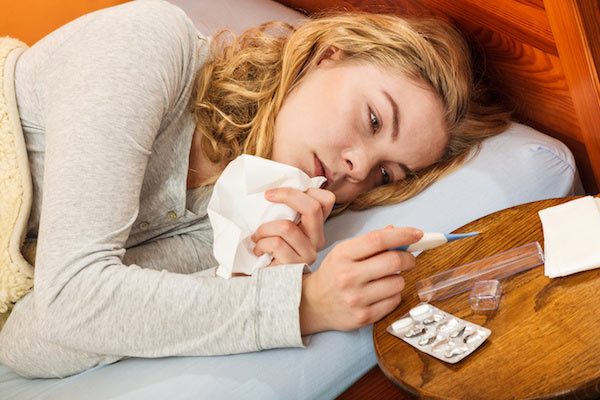Seasonal flu, according to the WHO, is a respiratory infection and very common in all parts of the world.
The symptoms of seasonal flu are: sudden onset of fever, cough, sore throat, body aches and fatigue.
Treatment aims to relieve symptoms. People with the flu should rest and drink plenty of fluids. Most people recover on their own within a week. Severe cases and people with risk factors may require medical attention.
Seasonal flu is usually caused by influenza A and B viruses. Every year there are new strains of the flu virus.
There are four types of flu viruses: A, B, C and D. Flu symptoms generally begin about two days after infection by a person carrying the virus.
When a person has seasonal flu, they may present the following symptoms:
– sudden onset of fever
– dry cough, usually.
-headache
– muscle and joint pain
– intense general malaise
-sore throat
-runny nose.
The cough can be severe and last two or more weeks. Most people recover from fever and other symptoms within 5 to 7 days, without needing medical attention. However, the flu can cause serious illness or death, especially among high-risk groups, for example, young children, pregnant women, older people, healthcare professionals, and people with serious illnesses.
Seasonal flu symptoms can worsen with other chronic illnesses and, in severe cases, lead to pneumonia and sepsis. People with other medical problems or serious symptoms should seek medical attention.
In industrialized countries, most flu-related deaths occur in people aged 65 and older.
The effects of seasonal epidemics in developing countries are not well understood, but research indicates that 99% of under-five deaths with influenza-related lower respiratory tract infection occur in these countries.
Due to their exposure to patients, health and care workers are at high risk of becoming infected with and transmitting flu viruses, especially to vulnerable people. Vaccination can protect healthcare workers and the people around them.
The vaccine usually prevents most cases of the flu. But even if you get the flu after getting vaccinated, your symptoms will be milder and you will be less likely to have problems from the flu. You cannot get the flu from getting vaccinated.
Seasonal flu spreads easily and spreads quickly in settings such as schools and nursing homes. When infected people cough or sneeze, they disperse the virus into the air and can thus infect people who are very close. The virus can also be transmitted through contaminated hands. To prevent transmission, you should wash your hands frequently and cover your mouth and nose with a tissue when coughing.
In temperate climates, seasonal epidemics occur mainly during the winter, while in tropical regions they can appear throughout the year, producing more irregular outbreaks.
The diagnosis of seasonal flu in most cases is diagnosed in a clinic. Other respiratory viruses can also cause influenza-like syndromes that make differential diagnosis difficult during periods of low influenza activity or outside epidemic situations, such as: severe acute respiratory syndrome coronavirus type 2, rhinoviruses, respiratory syncytial virus , parainfluenza viruses and adenoviruses.
To establish a definitive diagnosis, it is necessary to obtain adequate respiratory samples and perform laboratory tests.
Rapid diagnostic tests are used in clinical settings, but their sensitivity is low compared to RT-PCR, and their reliability depends largely on the conditions of use.
Most people recover from the flu on their own. Those with severe symptoms or other medical conditions should go to health centers for treatment.
People with mild symptoms should: stay home to avoid infecting others
Rest, drink plenty of fluids, and seek medical attention if symptoms worsen.
Prevention is through vaccination which is the best way to prevent the flu. There are safe and effective vaccines that have been used for more than 60 years. Immunity from vaccination disappears over time, so annual vaccination is recommended.
Vaccination is especially important in people at high risk of complications and the people who care for them.
Other ways to prevent the flu without receiving the vaccine: wash and dry your hands frequently, cover your nose and mouth when coughing or sneezing, properly dispose of used disposable tissues, stay home if you feel sick, avoid direct contact with people If sick, avoid touching your eyes, nose and mouth.
WHO, through the Global Influenza Program and GISRS, WHO, in collaboration with other partners, continuously monitors influenza viruses globally and recommends the composition of seasonal influenza vaccines twice a year. . This Organization works to strengthen national, regional and global capacities to respond to influenza.
FONT
https://www.who.int/es/health-topics/influenza-seasonal#tab=tab_1
https://www.cigna.com/es-us/knowledge-center/hw/temas-de-salud/gripe-estacional-hw122012









